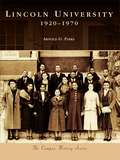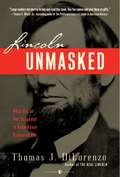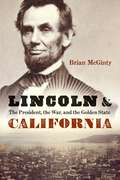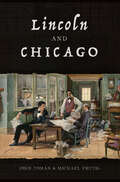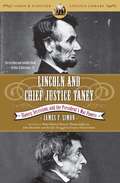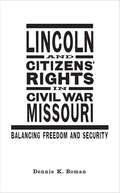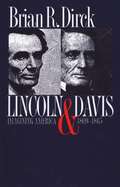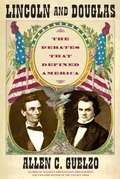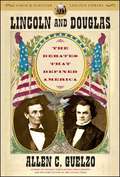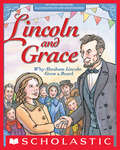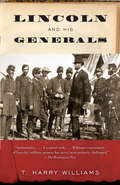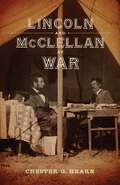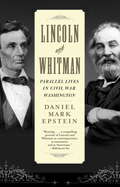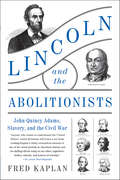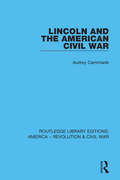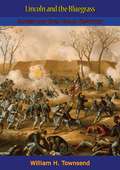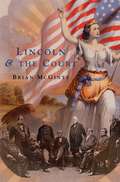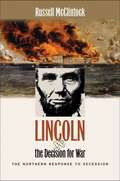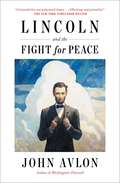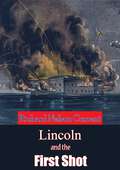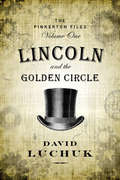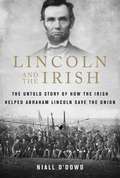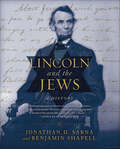- Table View
- List View
Lincoln University: 1920-1970 (Campus History)
by Arnold G. ParksLincoln University was founded in 1866 for the education of freed blacks after the Civil War. This book focuses on the years between 1920 and 1970, a span of time during which many of the university'smost signifi cant developments occurred. During this period, Lincoln Institute was elevated to university status, and graduate programs were added to the curriculum. A court-ordered law school was established and graduated many accomplished and respected African American attorneys before disbanding in the 1950s. During this era, the university was often referred to as "the Harvard of the Midwest" due to the acclaimed reputation of its faculty. Many alumni have made outstanding contributions at local, state, and national levels. After the 1954 United States Supreme Court Brown v. Board of Education of Topeka decision, the university integrated its student body. As a result, student enrollment changed dramatically from all black to a signifi cantly white clientele. Today the university retains its designation as a historicallyblack college/university.
Lincoln Unmasked: What You're Not Supposed to Know About Dishonest Abe
by Thomas DilorenzoWhat if you were told that the revered leader Abraham Lincoln was actually a political tyrant who stifled his opponents by suppressing their civil rights? What if you learned that the man so affectionately referred to as the "Great Emancipator" supported white supremacy and pledged not to interfere with slavery in the South? Would you suddenly start to question everything you thought you knew about Lincoln and his presidency? You should. Thomas J. DiLorenzo, who ignited a fierce debate about Lincoln's legacy with his book The Real Lincoln, now presents a litany of stunning new revelations that explode the most enduring (and pernicious) myths about our sixteenth president. Marshaling an astonishing amount of new evidence, Lincoln Unmasked offers an alarming portrait of a political manipulator and opportunist who bears little resemblance to the heroic, stoic, and principled figure of mainstream history. Did you know that Lincoln . . . * did NOT save the union? In fact, Lincoln did more than any other individual to destroy the voluntary union the Founding Fathers recognized. * did NOT want to free the slaves? Lincoln, who did not believe in equality of the races, wanted the Constitution to make slavery "irrevocable." * was NOT a champion of the Constitution? Contrary to his high-minded rhetoric, Lincoln repeatedly trampled on the Constitution--and even issued an arrest warrant for the chief justice of the United States! * was NOT a great statesman? Lincoln was actually a warmonger who manipulated his own people into a civil war.* did NOT utter many of his most admired quotations? DiLorenzo exposes a legion of statements that have been falsely attributed to Lincoln for generations--usually to enhance his image. In addition to detailing Lincoln's offenses against the principles of freedom, equality, and states' rights, Lincoln Unmasked exposes the vast network of academics, historians, politicians, and other "gatekeepers" who have sanitized his true beliefs and willfully distorted his legacy. DiLorenzo reveals how the deification of Lincoln reflects a not-so-hidden agenda to expand the size and scope of the American state far beyond what the Founding Fathers envisioned--an expansion that Lincoln himself began. The hagiographers have shaped Lincoln's image to the point that it has become more fiction than fact. With Lincoln Unmasked, DiLorenzo shows us an Abraham Lincoln without the rhetoric, lies, and political bias that have clouded a disastrous president's enduring damage to the nation.
Lincoln and California: The President, the War, and the Golden State
by Brian McGintyThe ties that bound Abraham Lincoln to California, and California to Lincoln, have long been overlooked by historians. Although the great Civil War president has been the subject of thousands of books, his important relationship with the Western state, both before and during the war—the part it played in bringing on the great conflict and the help it gave him in winning it—have been little described and imperfectly understood. In Lincoln and California Brian McGinty explains the relationship between the president and the Golden State, describing important events that took place in California and elsewhere during Lincoln’s lifetime. He includes the histories of Lincoln’s close friends and personal acquaintances who made history as they went to California, lived there, and helped to keep it part of the imperiled Union. McGinty demonstrates that California was in large part responsible for beginning the Civil War, as the principal purpose of its conquest in the Mexican War was to acquire land into which the Southern states could extend their cotton-growing and slaveholding empire. <p><p>The decision of California’s first voters to exclude slavery from the state but to enact virulently racist legislation encouraged Southerners’ hope that, if they established a separate republic, it would become an independent slave nation with the power to extend its territory to the Pacific coast of North America and into the Caribbean and Latin America. Lincoln’s opposition to their plans unleashed the Civil War. <p><p>As the struggle played out, however, the hopes of the proslavery Confederates were ultimately defeated because California played a vital role in helping Lincoln save the Union. Lincoln and California shines new light on an important state, a pivotal president, and a turning point in American history.
Lincoln and Chicago
by John Toman Michael FrutigAbraham Lincoln and Chicago both generate countless books, but this is the first in-depth examination of the actual relationship between the Prairie State's biggest city and its most famous citizen.The Illinois Rail Splitter's influence can be felt across the Land of Lincoln, but his relationship with Chicago was pivotal in his journey to the national stage. Lincoln first came to Chicago in 1847, a year before the Illinois-Michigan Canal opened and brought spectacular wealth to the region. The Midwestern metropolis is where Lincoln would meet the backers that ultimately propelled him into the White House. Tens of thousands of Chicagoans viewed his coffin at its last stop before its final destination in Springfield. John Toman and Michael Frutig explore how the people of Chicago managed to get their man into power on the eve of the greatest crisis the nation had ever faced.
Lincoln and Chief Justice Taney
by James F. SimonThe clashes between President Abraham Lincoln and Chief Justice Roger B. Taney over slavery, secession, and the president's constitutional war powers went to the heart of Lincoln's presidency. James Simon, author of the acclaimed What Kind of Nation -- an account of the battle between President Thomas Jefferson and Chief Justice John Marshall to define the new nation -- brings to vivid life the passionate struggle during the worst crisis in the nation's history, the Civil War. The issues that underlaid that crisis -- race, states' rights, and the president's wartime authority -- resonate today in the nation's political debate. Lincoln and Taney's bitter disagreements began with Taney's Dred Scott opinion in 1857, when the chief justice declared that the Constitution did not grant the black man any rights that the white man was bound to honor. In the famous Lincoln-Douglas debates, Lincoln attacked the opinion as a warped judicial interpretation of the Framers' intent and accused Taney of being a member of a pro-slavery national conspiracy. In his first inaugural address, President Lincoln insisted that the South had no legal right to secede. Taney, who administered the oath of office to Lincoln, believed that the South's secession was legal and in the best interests of both sections of the country. Once the Civil War began, Lincoln broadly interpreted his constitutional powers as commander in chief to prosecute the war, suspending the writ of habeas corpus, censoring the mails, and authorizing military courts to try civilians for treason. Taney opposed every presidential wartime initiative and openly challenged Lincoln's suspension of the writ of habeas corpus. He accused the president of assuming dictatorial powers in violation of the Constitution. Lincoln ignored Taney's protest, convinced that his actions were both constitutional and necessary to preserve the Union. Almost 150 years after Lincoln's and Taney's deaths, their words and actions reverberate in constitutional debate and political battle. Lincoln and Chief Justice Taney tells their dramatic story in fascinating detail.
Lincoln and Citizens' Rights in Civil War Missouri: Balancing Freedom and Security (Conflicting Worlds: New Dimensions of the American Civil War)
by Dennis K. BomanDuring the Civil War, the state of Missouri presented President Abraham Lincoln, United States military commanders, and state officials with an array of complex and difficult problems. Although Missouri did not secede, a large minority of residents owned slaves, sympathized with secession, or favored the Confederacy. Many residents joined a Confederate state militia, became pro-Confederate guerrillas, or helped the cause of the South in some subversive manner. In order to subdue such disloyalty, Lincoln supported Missouri's provisional Unionist government by ordering troops into the state and approving an array of measures that ultimately infringed on the civil liberties of residents. In this thorough investigation of these policies, Dennis K. Boman reveals the difficulties that the president, military officials, and state authorities faced in trying to curb traitorous activity while upholding the spirit of the United States Constitution. Boman explains that despite Lincoln's desire to disentangle himself from Missouri policy matters, he was never able to do so. Lincoln's challenge in Missouri continued even after the United States Army defeated the state's Confederate militia. Attention quickly turned to preventing Confederate guerrillas from attacking Missouri's railway system and from ruthlessly murdering, pillaging, and terrorizing loyal inhabitants. Eventually military officials established tribunals to prosecute captured insurgents. In his role as commander-in-chief, Lincoln oversaw these tribunals and worked with Missouri governor Hamilton R. Gamble in establishing additional policies to repress acts of subversion while simultaneously protecting constitutional rights -- an incredibly difficult balancing act. For example, while supporting the suppression of disloyal newspapers and the arrest of persons suspected of aiding the enemy, Lincoln repealed orders violating property rights when they conflicted with federal law. While mitigating the severity of sentences handed down by military courts, Boman shows, Lincoln advocated requiring voters and officeholders to take loyalty oaths and countenanced the summary execution of guerrillas captured with weapons in the field. One of the first books to explore Lincoln's role in dealing with an extensive guerrilla insurgency, Lincoln and Citizens' Rights in Civil War Missouri illustrates the difficulty of suppressing dissent while upholding the Constitution, a feat as complicated during the Civil War as it is for the War on Terror.
Lincoln and Davis: Imagining America, 1809-1865
by Brian R. DirckAbraham Lincoln: the Great Emancipator, savior of the Union, and revered national hero. Jefferson Davis: defender of slavery, leader of a lost cause, and forlorn object of scorn. Both Lincoln and Davis remain locked in the American psyche as iconic symbols of victory and defeat. They presided over a terrible war that decided the fate of slavery and severely tested each man's resolve and potential for greatness. But, as Brian Dirck shows, such images tend to obscure the larger visions that compelled both men to pursue policies and actions that resulted in such a devastating national tragedy. Going well beyond most conventional accounts, Dirck examines Lincoln's and Davis's respective ideas concerning national identity, highlighting the strengths and shortcomings of each leader's worldview. By focusing on issues that have often been overlooked in previous studies of Lincoln and Davis-and of the war in general-he reveals the ways in which these two leaders viewed that imagined community called the American nation. The first comprehensive and detailed study to compare the two men's national imaginations, Dirck's study provides a provocative analysis of how their everyday lives-the influence of fathers and friends, jobs and homes-worked in complex ways to shape Lincoln's and Davis's perceptions of what the American nation was supposed to be and could become and how those images could reject or accommodate the institution of slavery. Dirck contends that Lincoln subscribed to the notion of a "nation of strangers" in which people never really knew one another's hearts, reflecting his wariness of sentimental attachment, while Davis held to a "community of sentiment" based on honor and comradeship that depended a great deal on emotional bonding. As Dirck shows, these two ideals are very much a part of the current national conversation-among citizens, scholars, and politicians—that has brought Davis back into the fold of great Americans while challenging many of the clichés that surround the Lincoln myth. Ultimately, Dirck argues, the imagined communities of these two remarkable men transcend the experience of war to illuminate the ongoing debates over what it means to be an American. Through this engaging and original work, he urges a restoration of balance to our understanding—not only of Lincoln and Davis, but also of the contributions made by North and South alike to those debates.
Lincoln and Douglas: The Debates That Defined America
by Allen C. GuelzoIn 1858, Abraham Lincoln was known as a successful Illinois lawyer who had achieved some prominence in state politics as a leader in the new Republican Party. Two years later, he was elected president and was on his way to becoming the greatest chief executive in American history. What carried this one-term congressman from obscurity to fame was the campaign he mounted for the United States Senate against the country's most formidable politician, Stephen A. Douglas, in the summer and fall of 1858. Lincoln challenged Douglas directly in one of his greatest speeches -- "A house divided against itself cannot stand" -- and confronted Douglas on the questions of slavery and the inviolability of the Union in seven fierce debates. As this brilliant narrative by the prize-winning Lincoln scholar Allen Guelzo dramatizes, Lincoln would emerge a predominant national figure, the leader of his party, the man who would bear the burden of the national confrontation. Of course, the great issue between Lincoln and Douglas was slavery. Douglas was the champion of "popular sovereignty," of letting states and territories decide for themselves whether to legalize slavery. Lincoln drew a moral line, arguing that slavery was a violation both of natural law and of the principles expressed in the Declaration of Independence. No majority could ever make slavery right, he argued. Lincoln lost that Senate race to Douglas, though he came close to toppling the "Little Giant," whom almost everyone thought was unbeatable. Guelzo's Lincoln and Douglas brings alive their debates and this whole year of campaigns and underscores their centrality in the greatest conflict in American history. The encounters between Lincoln and Douglas engage a key question in American political life: What is democracy's purpose? Is it to satisfy the desires of the majority? Or is it to achieve a just and moral public order? These were the real questions in 1858 that led to the Civil War. They remain questions for Americans today.
Lincoln and Douglas: The Debates that Defined America
by Allen C. GuelzoFrom the two-time winner of the prestigious Lincoln Prize, a stirring and surprising account of the debates that made Lincoln a national figure and defined the slavery issue that would bring the country to war.In 1858, Abraham Lincoln was known as a successful Illinois lawyer who had achieved some prominence in state politics as a leader in the new Republican Party. Two years later, he was elected president and was on his way to becoming the greatest chief executive in American history. What carried this one-term congressman from obscurity to fame was the campaign he mounted for the United States Senate against the country’s most formidable politician, Stephen A. Douglas, in the summer and fall of 1858. As this brilliant narrative by the prize-winning Lincoln scholar Allen Guelzo dramatizes, Lincoln would emerge a predominant national figure, the leader of his party, the man who would bear the burden of the national confrontation. Lincoln lost that Senate race to Douglas, though he came close to toppling the “Little Giant,” whom almost everyone thought was unbeatable. Guelzo’s Lincoln and Douglas brings alive their debates and this whole year of campaigns and underscores their centrality in the greatest conflict in American history. The encounters between Lincoln and Douglas engage a key question in American political life: What is democracy's purpose? Is it to satisfy the desires of the majority? Or is it to achieve a just and moral public order? These were the real questions in 1858 that led to the Civil War. They remain questions for Americans today.
Lincoln and Grace: Why Abraham Lincoln Grew a Beard
by Ann Kronheimer Steve MetzgerA fresh and heartwarming story about Abraham Lincoln and the young girl who inspired his signature beard.Abraham Lincoln is one of the most recognizable people, let alone presidents, in the history of the United States. Perhaps it's because his face can be seen everywhere from the $5 bill in your wallet and the penny in your pocket to national monuments across the country. Or maybe it's simply because of his signature beard. Could you ever picture Lincoln without it? I bet you would never guess that there is one little girl in particular to thank for Lincoln's beard.LINCOLN AND GRACE is the story of Grace Bedell--the eleven-year-old who got a President to listen to her advice. In addition to learning the fascinating true story behind Lincoln's beard, children will love it because it shows that one voice--even one as small as their own--can matter.
Lincoln and Grant: The Westerners Who Won the Civil War
by Edward H. Bonekemper IIILincoln and Grant is an intimate dual-portrait of President Abraham Lincoln and General Ulysses S. Grant: their ordinary "Western" backgrounds, their early struggles to succeed, and their history-making relationship during the Civil War. Though generally remembered by history as two very different personalities, the soft-spoken Lincoln and often-crude Grant in fact shared a similar drive and determination, as this in-depth character study illustrates.
Lincoln and His Generals
by T. Harry WilliamsEvaluates Lincoln's ability as a director of war and his influence on the development of a modern command system.From the Trade Paperback edition.
Lincoln and McClellan at War: A Novel (Voices of the South)
by Chester G. HearnAt the beginning of the Civil War, President Abraham Lincoln and his highest-ranking general, George B. McClellan, agreed that the United States must preserve the Union. Their differing strategies for accomplishing that goal, however, created constant conflict. In Lincoln and McClellan at War, Chester G. Hearn explores this troubled relationship, revealing its complexity and showing clearly why the two men -- both inexperienced with war -- eventually parted ways. A staunch Democrat who never lost his acrimony toward Republicans -- including the president -- McClellan first observed Lincoln as an attorney representing the Illinois Central Railroad and immediately disliked him. This underlying bias followed thirty-five-year-old McClellan into his role as general-in-chief of the Union army. Lincoln, a man without military training, promoted McClellan on the advice of cabinet members and counted on "Little Mac" to whip the army into shape and end the war quickly. McClellan comported himself with great confidence and won Lincoln's faith by brilliantly organizing the Army of the Potomac. Later, however, he lost Lincoln's trust by refusing to send what he called "the best army on the planet" into battle. The more frustrated Lincoln grew with McClellan's inaction, the more Lincoln studied authoritative works on military strategy and offered strategic combat advice to the general. McClellan resented the president's suggestions and habitually deflected them. Ultimately, Lincoln removed McClellan for what the president termed "the slows." According to Hearn, McClellan's intransigence stemmed largely from his reluctance to fight offensively. Thoroughly schooled in European defensive tactics, McClellan preferred that approach to fighting the war. His commander-in-chief, on the other hand, had a preference for using offensive tactics. This compelling study of two important and diverse figures reveals how personality and politics prolonged the Civil War.
Lincoln and Whitman: Parallel Lives in Civil War Washington
by Daniel Mark EpsteinIt was more than coincidence--indeed, it was all but fate--that the lives and thoughts of Abraham Lincoln and Walt Whitman should converge during the terrible years of the Civil War. Kindred spirits despite their profound differences in position and circumstance, Lincoln and Whitman shared a vision of the democratic character that sprang from the deepest part of their being. They had read or listened to each other's words at crucial turning points in their lives. Both were utterly transformed by the tragedy of the war. In this radiant book, poet and biographer Daniel Mark Epstein tracks the parallel lives of these two titans from the day that Lincoln first readLeaves of Grassto the elegy Whitman composed after Lincoln's assassination in 1865. Drawing on the rich trove of personal and newspaper accounts, diary records, and lore that has accumulated around both the president and the poet, Epstein structures his double portrait in a series of dramatic, atmospheric scenes. Whitman, though initially skeptical of the Illinois Republican, became enthralled when Lincoln stopped in New York on the way to his first inauguration. During the war years, after Whitman moved to Washington to minister to wounded soldiers, the poet's devotion to the president developed into a passion bordering on obsession. "Lincoln is particularly my man, and by the same token, I am Lincoln's man. " As Epstein shows, the influence and reverence flowed both ways. Lincoln had been deeply immersed in Whitman's verse when he wrote his incendiary "House Divided" speech, and Whitman remained an influence during the darkest years of the war. But their mutual impact went beyond the intellectual. Epstein brings to life the many friends and contacts his heroes shared--Lincoln's debonair private secretary John Hay, the fiery abolitionist senator Charles Sumner, the mysterious and possibly dangerous Polish Count Gurowski--as he unfolds the story of their legendary encounters in New York City and especially Washington during the war years. Blending history, biography, and a deeply informed appreciation of Whitman's verse and Lincoln's rhetoric, Epstein has written a masterful and original portrait of two great men and the era they shaped through the vision they held in common.
Lincoln and the Abolitionists: John Quincy Adams, Slavery, and the Civil War
by Fred Kaplan"Anyone who wants to understand the United States' racial divisions will learn a lot from reading Kaplan's richly researched account of one of the worst periods in American history and its chilling effects today in our cities, legislative bodies, schools, and houses of worship." — St. Louis Post-DispatchThe acclaimed biographer Fred Kaplan returns with a controversial exploration of how Abraham Lincoln’s and John Quincy Adams’ experiences with slavery and race shaped their differing viewpoints, providing perceptive insights into these two great presidents and a revealing perspective on race relations in modern AmericaThough the Emancipation Proclamation, limited as it was, ultimately defined his presidency, Lincoln was a man shaped by the values of the white America into which he was born. While he viewed slavery as a moral crime abhorrent to American principles, he disapproved of antislavery activists. Until the last year of his life, he advocated “voluntary deportation,” concerned that free blacks in a white society would result in centuries of conflict. In 1861, he reluctantly took the nation to war to save it. While this devastating struggle would preserve the Union, it would also abolish slavery—creating the biracial democracy Lincoln feared.Years earlier, John Quincy Adams had become convinced that slavery would eventually destroy the Union. Only through civil war, sparked by a slave insurrection or secession, would slavery end and the Union be preserved. Deeply sympathetic to abolitionists and abolitionism, Adams believed that a multiracial America was inevitable. Lincoln and the Abolitionists, a frank look at Lincoln, “warts and all,” including his limitations as a wartime leader, provides an in-depth look at how these two presidents came to see the issues of slavery and race, and how that understanding shaped their perspectives.Its supporting cast of characters is colorful, from the obscure to the famous: Dorcas Allen, Moses Parsons, Usher F. Linder, Elijah Lovejoy, William Channing, Wendell Phillips, Rufus King, Hannibal Hamlin, Andrew Johnson, Abigail Adams, John Adams, Thomas Jefferson, Henry Clay, Stephen A. Douglas, and Frederick Douglass, among scores of significant others. In a far-reaching historical narrative, Kaplan offers a nuanced appreciation of the great men—Lincoln as an antislavery moralist who believed in an exclusively white America, and Adams as an antislavery activist who had no doubt that the United States would become a multiracial nation—and the events that have characterized race relations in America for more than a century, a legacy that continues to haunt us all.
Lincoln and the American Civil War
by Audrey CammiadeOriginally published in 1967, this book is a concise and ideal study of one of the most important periods of American history and is ideal for A Level students and as an introduction for undergraduates. It discusses the social, economic and political context for Lincoln’s meteoric rise and the legacy of his many achievements including the abolition of slavery.
Lincoln and the Bluegrass: Slavery and Civil War in Kentucky
by William H. TownsendTHE BLUEGRASS REGION OF KENTUCKY was the only part of the slaveholding South that Abraham Lincoln knew intimately. Even before the young Illinois lawyer had married a daughter of one of Lexington’s leading statesmen, he had taken Robert Todd’s close friend, Henry Clay, as his political idol. Mary Todd, who had grown to young womanhood in Lexington, widened Lincoln’s circle of acquaintances in the Bluegrass to include such diverse personalities as Judge George Robertson, Lincoln’s counsel, who supported emancipation in the abstract but indignantly demanded that the President protect his slave property; the fiery Cassius M. Clay, who urged Lincoln to proclaim immediate emancipation and who raised a motley battalion in Washington, D.C., to defend the Capital; Dr. Robert J. Breckinridge, the doughty Presbyterian minister who refused to ask special treatment for the members of his family in the Confederacy; and the Doctor’s nephew, Vice-President John C. Breckinridge, who rejected a demand that he use his position to thwart Lincoln’s election but immediately took up arms against him.With the gifted pen that has won praise from so many students of Lincoln and the Civil War, William H. Townsend here describes the fabulous Bluegrass region which had so large a part in shaping Lincoln’s views about emancipation and secession. Lexington, heart of the Bluegrass, had early been called the “Athens of the West,” and the grace and culture of its pleasure-loving aristocracy could hardly have failed to impress any thinking man. Here Lincoln saw the genteel side of slavery—the trusted mammies whose word was law, the valets whose talent for mixing mint juleps was famous—but he also saw the public whipping post, slave jails, and slave auctions, and the disregard for the humanity of the Negro.
Lincoln and the Court
by Brian McGintyIn a meticulously researched and engagingly written narrative, McGinty rescues the story of Abraham Lincoln and the Supreme Court from long and undeserved neglect, recounting the compelling history of the Civil War president's relations with the nation's highest tribunal and the role it played in resolving the agonizing issues raised by the conflict.
Lincoln and the Decision for War
by Russell McclintockWhen Abraham Lincoln's election in 1860 prompted several Southern states to secede, the North was sharply divided over how to respond. In this groundbreaking and highly praised book, McClintock follows the decision-making process from bitter partisan rancor to consensus. From small towns to big cities and from state capitals to Washington, D.C., McClintock highlights individuals both powerful and obscure to demonstrate the ways ordinary citizens, party activists, state officials, and national leaders interacted to influence the Northern response to what was essentially a political crisis. He argues that although Northerners' reactions to Southern secession were understood and expressed through partisan newspapers and officials, the decision fell into the hands of an ever-smaller group of people until finally it was Lincoln alone who would choose whether the future of the American republic was to be determined through peace or by sword.
Lincoln and the Democrats
by Neely Mark E. Jr.Lincoln and the Democrats describes the vexatious behavior of a two-party system in war and points to the sound parts of the American system which proved to be the country's salvation: local civic pride, and quiet nonpartisanship in mobilization and funding for the war, for example. While revealing that the role of a noxious 'white supremacy' in American politics of the period has been exaggerated - as has the power of the Copperheads - Neely revives the claim that the Civil War put the country on the road to 'human rights', and also uncovers a previously unnoticed tendency toward deceptive and impractical grandstanding on the Constitution during war in the United States.
Lincoln and the Fight for Peace
by John AvlonA groundbreaking, revelatory history of Abraham Lincoln&’s plan to secure a just and lasting peace after the Civil War—a vision that inspired future presidents as well as the world&’s most famous peacemakers, including Nelson Mandela, Mahatma Gandhi, and Martin Luther King, Jr. It is a story of war and peace, race and reconciliation.As the tide of the Civil War turned in the spring of 1865, Abraham Lincoln took a dangerous two-week trip to visit the troops on the front lines accompanied by his young son, seeing combat up close, meeting liberated slaves in the ruins of Richmond, and comforting wounded Union and Confederate soldiers. The power of Lincoln&’s personal example in the closing days of the war offers a portrait of a peacemaker. He did not demonize people he disagreed with. He used humor, logic, and scripture to depolarize bitter debates. Balancing moral courage with moderation, Lincoln believed that decency could be the most practical form of politics, but he understood that people were more inclined to listen to reason when greeted from a position of strength. Ulysses S. Grant&’s famously generous terms of surrender to General Robert E. Lee at Appomattox that April were a direct expression of the president&’s belief that a soft peace should follow a hard war.While his assassination sent the country careening off course, Lincoln&’s vision would be vindicated long after his death, inspiring future generations in their own quests to secure a just and lasting peace. As US General Lucius Clay, architect of the post-WWII German occupation, said when asked what guided his decisions: &“I tried to think of the kind of occupation the South would have had if Abraham Lincoln had lived.&” Lincoln and the Fight for Peace reveals how Lincoln&’s character informed his commitment to unconditional surrender followed by a magnanimous peace. Even during the Civil War, surrounded by reactionaries and radicals, he refused to back down from his belief that there is more that unites us than divides us. But he also understood that peace needs to be waged with as much intensity as war. Lincoln&’s plan to win the peace is his unfinished symphony, but in its existing notes, we can find an anthem that can begin to bridge our divisions today.
Lincoln and the First Shot
by Richard Nelson CurrentLincoln and the First Shot by Richard Nelson Current examines the tense period leading up to the outbreak of the American Civil War, focusing on President Abraham Lincoln's handling of the secession crisis. With Fort Sumter as the centerpiece of the drama, Current explores how Lincoln navigated the treacherous waters of diplomacy, public opinion, and military strategy to maintain the Union without initiating open conflict.The book delves deeply into Lincoln's political acumen and his efforts to balance firmness with restraint in the face of Southern provocations, particularly those of the newly formed Confederate government. By drawing on an array of historical sources, Current paints a nuanced portrait of Lincoln as a leader determined to preserve peace as long as possible while standing firm on the principle that secession was unconstitutional.The narrative highlights critical moments, such as Lincoln's decision to resupply Fort Sumter, revealing the careful calculations behind his actions and the eventual Confederate attack that ignited the war. Lincoln and the First Shot offers a gripping analysis of the president's early leadership, providing valuable insight into the complexities of his decisions and the forces that ultimately led to the first battle of the Civil War.
Lincoln and the Golden Circle: The Pinkerton Files, Volume 1
by David LuchukThe Pinkerton Files is based on the new audio series starring Battlestar Galactica's Michael Hogan. It sets the real cases of America's first private detective in a world of radical inventions driving a bitterly divided nation toward civil war. Agency founder Allan Pinkerton senses a conspiracy mounting against him, his sons and his operatives. Every step they take toward solving three seemingly disconnected cases draws them further into a conflict that will be their downfall. If Allan allows them to become embroiled in the war, they will never find their way out. Lincoln and the Golden Circle launches as a simple assignment to protect a rail line from sabotage but explodes when one of Allan's agents is murdered, his son is arrested and his protege is wickedly assaulted. With police descending on his headquarters, Allan must choose whether to commit his detectives to a death defying sprint in a final attempt to save the President's life.
Lincoln and the Irish: The Untold Story of How the Irish Helped Abraham Lincoln Save the Union
by Niall O'DowdAn unprecedented narrative of the relationship that swung the Civil War. When Pickett charged at Gettysburg, it was the all-Irish Pennsylvania 69th who held fast while the surrounding regiments broke and ran. And it was Abraham Lincoln who, a year earlier at Malvern Hill, picked up a corner of one of the Irish colors, kissed it, and said, “God bless the Irish flag.” Lincoln and the Irish untangles one of the most fascinating subtexts of the Civil War: Abraham Lincoln’s relationship with the men and women coming to America to escape the Irish famine. Renowned Irish-American journalist Niall O’Dowd gives unprecedented insight into a relationship that began with mutual disdain. Lincoln saw the Irish as instinctive supporters of the Democratic opposition, while the Irish saw the English landlord class in Lincoln’s Republicans. But that dynamic would evolve, and the Lincoln whose first political actions included intimidating Irish voters at the polls would eventually hire Irish nannies and donate to the Irish famine fund. When he was voted into the White House, Lincoln surrounded himself with Irish staff, much to the chagrin of a senior aide who complained about the Hibernian cabal. And the Irish would repay Lincoln’s faith—their numbers and courage would help swing the Civil War in his favor, and among them would be some of his best generals and staunchest advocates.
Lincoln and the Jews: A History
by Jonathan D. Sarna Benjamin ShapellOne hundred and fifty years after Abraham Lincoln's death, the full story of his extraordinary relationship with Jews is told here for the first time. Lincoln and the Jews: A History provides readers both with a captivating narrative of his interactions with Jews, and with the opportunity to immerse themselves in rare manuscripts and images, many from the Shapell Lincoln Collection, that show Lincoln in a way he has never been seen before.Lincoln's lifetime coincided with the emergence of Jews on the national scene in the United States. When he was born, in 1809, scarcely 3,000 Jews lived in the entire country. By the time of his assassination in 1865, large-scale immigration, principally from central Europe, had brought that number up to more than 150,000. Many Americans, including members of Lincoln's cabinet and many of his top generals during the Civil War, were alarmed by this development and treated Jews as second-class citizens and religious outsiders. Lincoln, this book shows, exhibited precisely the opposite tendency. He also expressed a uniquely deep knowledge of the Old Testament, employing its language and concepts in some of his most important writings. He befriended Jews from a young age, promoted Jewish equality, appointed numerous Jews to public office, had Jewish advisors and supporters starting already from the early 1850s, as well as later during his two presidential campaigns, and in response to Jewish sensitivities, even changed the way he thought and spoke about America. Through his actions and his rhetoric—replacing "Christian nation," for example, with "this nation under God"—he embraced Jews as insiders. In this groundbreaking work, the product of meticulous research, historian Jonathan D. Sarna and collector Benjamin Shapell reveal how Lincoln's remarkable relationship with American Jews impacted both his path to the presidency and his policy decisions as president. The volume uncovers a new and previously unknown feature of Abraham Lincoln's life, one that broadened him, and, as a result, broadened America.
